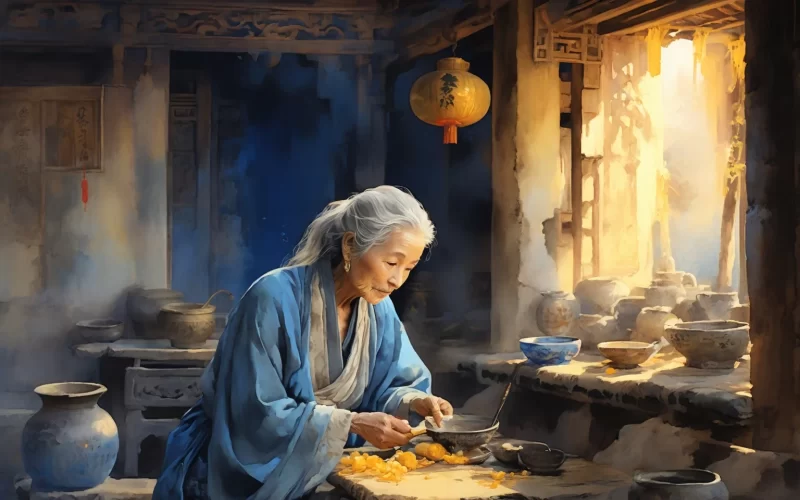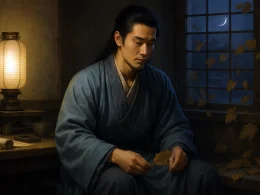I lodge under the five pine trees,
In solitude, finding no joy.
The farming family’s autumn toil is bitter;
The neighbor girl pounds rice in the cold night.
She kneels to present a dish of wild rice;
The moonlight glistens on the plain white plate.
I am ashamed before this “drifting mother”;
Thrice declining, I cannot bring myself to eat.
Original Poem
「宿五松山下荀媪家」
李白
我宿五松下,寂寥无所欢。
田家秋作苦,邻女夜舂寒。
跪进雕胡饭,月光明素盘。
令人惭漂母,三谢不能餐。
Interpretation
Composed around 750 CE during Li Bai's travels to Wusong Mountain in Anhui, this work stems from the poet's later years. Having experienced political disillusionment and life's turbulence, his earlier exuberance had matured into profound observation of human realities. While lodging with an impoverished elderly woman named Xun, this ordinary encounter sparked deep resonance, yielding a masterpiece radiant with humanistic compassion.
First Couplet: "我宿五松下,寂寥无所欢。"
Wǒ sù Wǔsōng xià, jìliáo wú suǒ huān.
Lodging beneath Wusong's pines, In solitude I find no joy.
The opening establishes a somber atmosphere. "Lodging" denotes the traveler's transient status, while "beneath Wusong's pines" sketches an isolated setting. "Solitude" and "no joy" operate doubly—describing both the environment's starkness and the poet's inner state, creating a receptive mindset for witnessing rural hardship.
Second Couplet: "田家秋作苦,邻女夜舂寒。"
Tiánjiā qiū zuò kǔ, línnǚ yè chōng hán.
Farming autumn toil is bitter; Neighbors' night-pounding sounds chill.
Using stark realism, the poet captures emblematic scenes: "autumn toil's bitterness" encapsulates daytime fieldwork; "night-pounding's chill" offers a piercing detail. "Chill" is pivotal—conveying seasonal cold, auditory sensation, and ultimately the poet's judgment on marginalized lives steeped in hardship. The unceasing labor reveals oppressive exploitation.
Third Couplet: "跪进雕胡饭,月光明素盘。"
Guì jìn diāohú fàn, yuèguāng míng sù pán.
Kneeling, she offers wild rice meal; Moonlight brightens the plain plate.
This couplet marks an emotional turning point, depicting a sacred moment. "Kneeling" reflects not servility but the highest respect a poor elder could offer a scholar. Her gift of "wild rice meal" represents her most precious food. The poet elevates the scene with "moonlight brightening the plain plate"—a transcendent image where lunar purity sanctifies the humble meal, illuminating both material poverty and spiritual dignity.
Fourth Couplet: "令人惭漂母,三谢不能餐。"
Lìng rén cán piǎomǔ, sān xiè bùnéng cān.
Shaming me like the washerwoman's charity; Thrice declining, I cannot eat.
Naturally invoking the典故 of Han Xin and the washerwoman, the poet's "shame" stems from multifaceted guilt: as an intellectual powerless to alleviate suffering; as a recipient of sacrificial generosity; and as one who, like the pre-success Han Xin, might offer no tangible repayment. This profound humility makes "thrice declining" deeply moving, revealing Li Bai's noble compassion.
Holistic Appreciation
Amid Li Bai's typically bold and transcendent style, this poem stands as a serene, polished gem showcasing his deep realist concern and humble humanism. Employing a zooming perspective—from the secluded pines, to generalized farm toil, to specific neighborly sounds, finally focusing on the kneeling meal offering—the poem's emotions evolve from personal solitude to public sympathy, ultimately ascending to reverence for ordinary nobility. This layered progression gives the deceptively simple verse devastating power.
Artistic Merits
- Profound Feeling in Plain Description: Unadorned lines like "farming autumn toil is bitter" achieve piercing effect through emblematic scenes (autumn labor, night pounding) and potent adjectives (bitter, chill).
- Sanctification Through Imagery: The "moonlight brightening the plain plate" elevates the meal from materiality to moral and aesthetic sanctity, rich in symbolism.
- Artful Allusion with Deepening Resonance: The reference to the "washerwoman" (from the Han dynasty tale of Han Xin) not only conveys gratitude but also intensifies the poet's self-reproach and philosophical contemplation of fate, adding profound historical weight to the personal moment.
- Synesthetic Mastery: "Night-pounding sounds chill" merges auditory and tactile senses, making hardship felt physically, enhancing artistic impact.
Insights
This millennial poem reveals that civilization's true measure lies not in elite achievements but in how society treats its marginalized members; personal nobility manifests not in generosity during prosperity but in kindness that endures through poverty. The impoverished Xun's offering of precious wild rice, coupled with Li Bai's responsive sense of unworthiness, together create humanity's most profound radiance. The work reminds us to always recognize the hardship of labor, cherish modest acts of kindness, and maintain self-reflective humility when receiving selfless gifts—this consciousness forming the most enduring bridge across social divisions.
About the poet

Li Bai (李白), 701 - 762 A.D., whose ancestral home was in Gansu, was preceded by Li Guang, a general of the Han Dynasty. Tang poetry is one of the brightest constellations in the history of Chinese literature, and one of the brightest stars is Li Bai.












